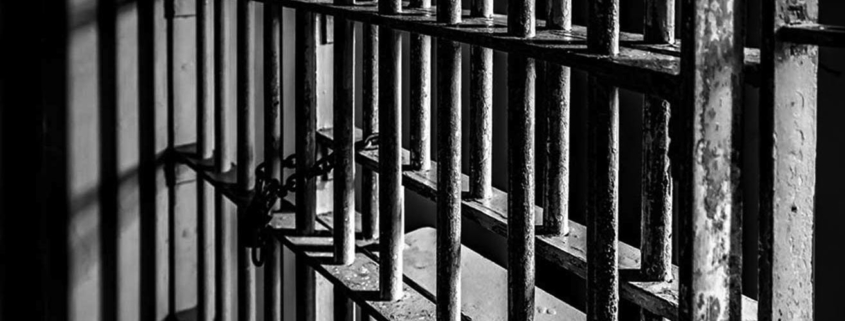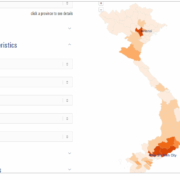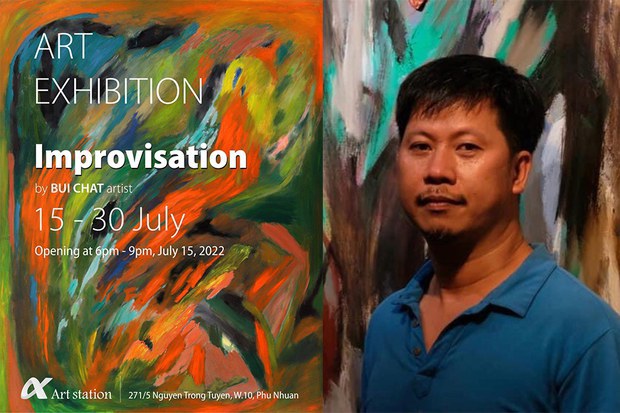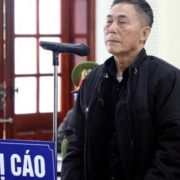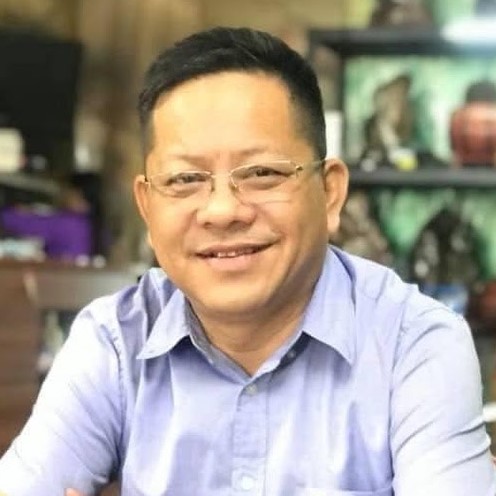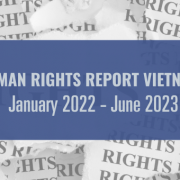Activists Issued A “Collective Declaration” Denouncing Systematic Violation of Right to Freedom of Movement
On May 24, 2019, 44 activists in Vietnam jointly issued a “Collective Declaration by Those Whose Freedom of Movement Has Been Violated” (hereinafter Declaration) in which they denounce the restriction of their movement by people believed to be working for the government. According to the Declaration, this violation of the basic right to freedom of movement routinely happens in the country, with around 600 victims in Ho Chi Minh City alone. The “how” of that tactic is worrisome: “Many people have had total strangers squat in front of their front door to guard their movement, not allowing them to leave their own home, sometimes using violence. When confronted, these strangers cannot produce any proper papers or warrants from the authorities. They would, more often than not, use vulgar and derogatory language to abuse and demean us. What’s worse is their frequent use of force to restrict our movement, sometimes causing us physical harm and even threatening our life.” The authorities have not taken any action to protect those citizens’ legitimate right to freedom of movement, which leads to the belief that those strangers act upon official order.
We believe that this harassment is not only a violation of their rights to freedom of movement and to liberty and security of the person, but also their right to equal protection of the law, since the government fails to take action to protect them because of their independent political opinions. We call upon the international community to hold the Vietnamese government accountable for this blatant violation of international law and to take action to protect peaceful activists whose life and physical integrity are in danger.
Below is the text of the Declaration in both English and Vietnamese.
© 2019 The 88 Project
—
Collective Declaration By Those Whose Freedom of Movement Has Been Violated
- Be it known, that “All individuals are created equal, endowed by their Creator with certain inalienable rights, including the right to Life, Liberty and the Pursuit of Happiness.”
- Be it known, that every human being has rights, of which the right to freedom of movement is inviolable. This right has been confirmed in the UN Charter created in 1945, in the Declaration of Human Rights in 1948 adopted by the General Assembly of the UN, in multiple International Conventions, as well as in the Constitution of Vietnam.
- Be it known, that Vietnam is a signatory of many important international conventions on human rights. Because the Constitution of Vietnam guarantees the freedom of movement by citizens as an unalienable right, it is the duty of the citizens and the government of Vietnam protect and promote these rights.
I. REALITY:
We are Vietnamese citizens suffering from harassment by strangers who oftentimes resort to violent means to restrict our freedom of movement for no apparent reasons. These inexplicable assaults seriously violate our rights, which have been clearly defined by the Constitution of Vietnam, the Charter of the United Nations in 1945, the Declaration of Human Rights by the UN General Assembly in 1948, as well as the many international conventions on human rights of which Vietnam is a signatory member and therefore is obligated to uphold.
These basic human rights and the right of citizens to move about freely have been routinely violated all across this country. Many people have had total strangers squat in front of their front door to guard their movement, not allowing them to leave their own home, sometimes using violence. In HCMC alone the number of victims is around 600 people. When confronted, these strangers cannot produce any proper papers or warrants from the authorities. They would, more often than not, use vulgar and derogatory language to abuse and demean us. What’s worse is their frequent use of force to restrict our movement, sometimes causing us physical harms and even threatening our life. There is no question that these illegal acts must be properly dealt with according to the law.
II. LEGAL BASES
- The Constitution of Vietnam establishes that:
Article 14: “In the Socialist Republic of Vietnam (SRV) all human rights, including rights regarding political, civilian, economic, cultural and social activities, shall be recognized, respected, protected and ensured according to the Constitution and the law. Human rights and the rights of citizens could only be restricted by law in cases of national defense, national security, social order, social safety, cultural values, or social well-being.”
Article 20: “Every individual is guaranteed the safety to their physical being and is protected by the law with regard to their health, honor and human dignity; individuals cannot be tortured or mistreated physically, mentally, or by any abuse practice that violates their body, health, honor or dignity.”
Article 16: “No individual shall be discriminated against in their lawful political, civic, economic, cultural or social activities.”
Article 23: “Citizens shall have the freedom to move around and reside anywhere in the country, the right to travel abroad, and the right to return. These activities shall be regulated by law.”
- The Civil Code of 2015 establishes that:
Part 1, Article 33: “Individuals have the right to be free from violation against their body, health and life.”
Part 1, Article 34: “The honor, dignity and reputation of each individual is inviolable and protected by the law.”
- Article 155 of the Criminal Code of 2015, amended in 2017 with regard to “Humiliating Others” states that: “Humiliating is understood to be actions that gravely offend the dignity or honor of someone. A person who commits this offense is someone who, through either words or actions, violate someone’s dignity via actions such as verbal abuse, shaving or cutting off someone’s hair, stripping off someone’s clothing, filming or photographing people without their consent… The perpetrator may exhibit behaviors such as threatening a prisoner with force, interrogating using violent means such as binding the prisoner up and beating them, forcing confessions, hitting them, threatening them, and generally subjugating them.”
- In addition, human rights and the freedom if movement have also been established in the Declaration on Human Rights adopted by the UN General Assembly in 1948, and in multiple international conventions of which Vietnam is a signatory country and therefore is obligated to respect and follow.
III. BASED ON THE REALITY AND LEGAL BASES STATED ABOVE, WE SOLEMNLY DECLARE:
- We are citizens who have all the rights according to the law; our rights cannot be unlawfully restricted, and they are not negotiable.
- Any action that attacks our freedom of movement, our body, our honor or our dignity is an attack on the law.
- To put an end to these obviously illegal actions that have been perpetuated for a very long time, we request that the authorities in Vietnam start acting responsibly and according to the law, and that the government start to build a plan to stop those who continue to obstruct the movement of the citizen
- If those people continue to harass us and restrict our movement, we shall exercise our right to “self-defense” according to Article 22 of the Criminal Code of 2015. Any physical consequences that result from such confrontations will be the responsibility of the authorities.
SUMMARY
We believe that within the current system of “unilateral power”, kept under total control by the communist party of Vietnam, constitutional law has been applied arbitrarily, only according to the wishes of the party. Today we are its victims. Tomorrow it will be our friends and families’ turn. Ultimately all citizens of Vietnam will have to live with this capricious legal system.
With this Collective Declaration, we want to make publicly known to all Vietnamese in the country as well as all over the world, to all international human rights organizations, and all world governments who care deeply about justice about the constant assault on basic human rights by the government of Vietnam. We sincerely call upon world governments and organizations that value human rights to push for strong sanctions in their dealing with Vietnam if this government continues to ignore its international obligations on human rights. Lastly, we demand that the government of Vietnam must immediately stop all of its illegal acts against the people, that the rule of law be respected, and that all citizens are treated fairly and equally before the law.
Vietnam, May 24, 2019
SIGNED
- Fr Nguyễn Hữu Giải, Retirement Home, Huế Diocese
- Fr Nguyễn Văn Lý, Retirement Home, Huế Diocese
- Lê Bảo Nhi, Freelance Journalist, Sài Gòn.
- Trần Bang, Engineer, Sài Gòn.
- Lê Công Định, Lawyer, Sài Gòn.
- Nguyễn Hồng Quang, Pastor, Sài Gòn.
- Nguyễn Mạnh Hùng, Pastor, Sài Gòn.
- Phạm Ngọc Thạch, Pastor, Sài Gòn.
- Ngô Thị Thứ, Teacher, Sài Gòn.
- Võ Văn Tạo, Freelance Journalist, Nha Trang.
- Đinh Đức Long, Doctor, Sài Gòn.
- Nguyễn Chí Trung, Businessman, Sài Gòn.
- Trương Văn Kim, Former Prisoner of Conscience, Lâm Đồng.
- Ngô Kim Hoa, Freelance Journalist, Sài Gòn.
- Nguyễn Thị Thái Lai, Volunteer at the Support Program for ARVN Disabled Veterans, Nha Trang.
- Lê Thị Ngọc Đa, victim of land grabbing, Long An.
- Mai Thị Nguyệt, victim of land grabbing, Long An.
- Trương Minh Tâm, victim of land grabbing, Long An.
- Lê Xuân Lộc, Priest, Redemptorist Church, Sài Gòn.
- Nguyễn Thanh Loan, Independent professional, Sài Gòn.
- Trịnh Toàn, Independent professional, Sài Gòn.
- Nguyễn Ngọc Tân, Independent professional, Vĩnh Long.
- Chu Vĩnh Hải, Independent Journalist, Bà Rịa – Vũng Tàu.
- Đinh Quang Tuyến, Independent professional, Sài Gòn.
- Phạm Ngọc Hoa, victim of land grabbing, Sài Gòn,
- Đỗ Thị Hồng Nhung, victim of land grabbing, Sài Gòn.
- Lê Thanh Dương, ARVN Disabled Veteran, Sài Gòn.
- Nguyễn Thị Thanh, Retiree, Sài Gòn.
- Phạm Bang, Retired Teacher, Thanh Hóa.
- Đoàn Thị Nữ, victim of land grabbing, Tiền Giang.
- Trương Thanh Quang, victim of land grabbing, Tiền Giang.
- Trần Thị Thảo, retired teacher, Hà Nội.
- Bùi Nghệ, retired, Sài Gòn.
- Vũ Mạnh Hùng, teacher, Chu Văn An Teachers Association, Hà Nội.
- Trương Văn Dũng, independent professional, Hà Nội.
- Nguyễn Thị Kim Thủy, victim of land grabbing, Tiền Giang.
- Lê Thị Ánh Nga, victim of land grabbing, Tiền Giang.
- Phạm Thị Quẩn, victim of land grabbing, Long An.
- Nguyễn Thị Tâm, victim of land grabbing, Long An.
- Trần Thị Hồng, victim of land grabbing, Bến Tre.
- Mai Bá Quang, victim of land grabbing, Bến Tre.
- Nguyễn Thuý Hạnh, Public relations professional., Hà Nội.
- Huỳnh Ngọc Chênh, journalist, Hà Nội.
- Đặng Bích Phượng, retiree, Hà Nội.
Translation © 2019 The 88 Project
Source: Le Cong Dinh
—
Dưới đây là TUYÊN BỐ CHUNG của những người đã và đang bị vi phạm quyền tự do đi lại, bị cầm giữ tại nhà. Nếu bạn cũng từng bị vi phạm quyền tự do đi lại, bị cầm giữ tại nhà như chúng tôi, xin mời bạn tham gia ký tên cùng chúng tôi. Nếu bạn chưa bị thì xin vui lòng ủng hộ chúng tôi bằng cách like, share và giúp phổ biến rộng rãi trên các phương tiện thông tin.
Hướng dẫn ghi danh: Xin vui lòng cho biết họ tên đầy đủ, nghề nghiệp, nơi cư trú, khoảng thời gian bị canh, và gởi về địa chỉ Email: [email protected]
TUYÊN BỐ CHUNG CỦA NHỮNG NGƯỜI BỊ XÂM PHẠM QUYỀN TỰ DO ĐI LẠI
- Xét rằng “Mọi người sinh ra đều bình đẳng, họ được Tạo hoá ban cho một số quyền tất yếu bất khả xâm phạm, trong đó có quyền sống, quyền tự do và quyền mưu cầu hạnh phúc”.
- Xét rằng quyền con người, trong đó có quyền tự do đi lại của công dân là bất khả xâm phạm. Quyền này đã được minh định trong Hiến chương Liên Hiệp Quốc năm 1945, Tuyên ngôn Quốc Tế Nhân Quyền năm 1948 của Đại Hội Đồng Liên Hiệp Quốc, các Công ước Quốc Tế và Hiến pháp Việt Nam về quyền con người.
- Xét rằng Việt Nam đã gia nhập, ký kết và cam kết thực thi các điều ước quốc tế quan trọng về quyền con người. Luật Hiến pháp Việt Nam khẳng định quyền tự do đi lại của công dân là bất khả xâm phạm, đấu tranh bảo vệ quyền con người là quyền và trách nhiệm của Nhà nước và công dân.I. THỰC TRẠNG:
Chúng tôi, những công dân Việt Nam thường xuyên bị những người lạ mặt vô cớ ngang nhiên xâm phạm, ngăn cản thô bạo quyền tự do đi lại của chúng tôi. Hành vi này đã vi phạm nghiêm trọng quyền tự do của công dân đã được minh định trong Hiến pháp nước CHXHCN Việt Nam; Hiến chương Liên Hiệp Quốc năm 1945; Tuyên ngôn Quốc Tế Nhân Quyền năm 1948 của Đại Hội Đồng Liên Hiệp Quốc; các Công ước Quốc Tế về quyền con người mà Việt Nam đã tham gia ký kết và cam kết thực hiện. Nhà nước Việt Nam luôn xác định việc tôn trọng, bảo vệ và thúc đẩy các quyền tự do cơ bản của con người là nguyên tắc của mọi chiến lược phát triển kinh tế-xã hội của đất nước.
Tuy nhiên, quyền con người, quyền tự do đi lại của công dân đã và đang bị xâm phạm nghiêm trọng trên phạm vi cả nước. Có rất nhiều công dân bị những người lạ mặt vô cớ ngang nhiên tới ngồi trước cửa nhà ngăn cản thô bạo không cho ra khỏi nhà, chỉ riêng tại Tp.HCM đã có khoảng 600 người. Những người lạ mặt này không xuất trình được lệnh điều động tới canh giữ chúng tôi. Trong nhiều trường hợp họ dùng những lời lẽ thô tục, vô văn hóa xúc phạm danh dự và nhân phẩm chúng tôi. Thậm chí nhiều khi họ còn dùng vũ lực ngăn cản, xâm phạm về thân thể gây tổn hại sức khỏe, đe dọa đến tính mạng chúng tôi. Những hành vi này vi phạm nghiêm trọng pháp luật Việt Nam cần phải xử lý theo quy định pháp luật.
II. CÁC CĂN CỨ PHÁP LÝ:
- Hiến pháp Việt Nam quy định:
Điều 14 “Ở nước CHXHCN Việt Nam, các quyền con người, quyền công dân về chính trị, dân sự, kinh tế, văn hóa, xã hội được công nhận, tôn trọng, bảo vệ, bảo đảm theo Hiến pháp và pháp luật. Quyền con người, quyền công dân chỉ có thể bị hạn chế theo quy định của luật trong trường hợp cần thiết vì lý do quốc phòng, an ninh quốc gia, trật tự, an toàn xã hội, đạo đức xã hội, sức khỏe của cộng đồng.
Điều 20: “Mọi người có quyền bất khả xâm phạm về thân thể, được pháp luật bảo hộ về sức khoẻ, danh dự và nhân phẩm; không bị tra tấn, bạo lực, truy bức, nhục hình hay bất kỳ hình thức đối xử nào khác xâm phạm thân thể, sức khỏe, xúc phạm danh dự, nhân phẩm”.
Điều 16: “Không ai bị phân biệt đối xử trong đời sống chính trị, dân sự, kinh tế, văn hóa, xã hội”.
Điều 23: “Công dân có quyền tự do đi lại và cư trú ở trong nước, có quyền ra nước ngoài và từ nước ngoài về nước. Việc thực hiện các quyền này do pháp luật quy định”.
- Bộ luật dân sự năm 2015 quy định:
Khoản 1 Điều 33: “Cá nhân có quyền bất khả xâm phạm về tính mạng, sức khỏe, thân thể”.
Khoản 1 Điều 34: “Danh dự, nhân phẩm, uy tín của cá nhân là bất khả xâm phạm và được pháp luật bảo vệ”.
- Điều 155 Bộ luật hình sự năm 2015 sửa đổi, bổ sung năm 2017 về “Tội làm nhục người khác”:
Làm nhục người khác được hiểu là hành vi xúc phạm nghiêm trọng nhân phẩm, danh dự của người khác. Người phạm tội có hành vi (bằng lời nói hoặc hành động) xúc phạm nghiêm trọng nhân phẩm, danh dự của người khác như lăng mạ, chửi rủa, cạo đầu, cắt tóc, lột quần áo, quay hình ảnh. Người phạm tội có thể có những hành vi vũ lực hoặc đe dọa dùng vũ lực như bắt trói, tra khảo, đấm đá, đe dọa, ép buộc người bị hại phải làm theo ý muốn của mình.
- Ngoài ra, quyền con người và quyền tự do đi lại còn được minh định trong Tuyên ngôn Quốc Tế Nhân Quyền năm 1948 của Đại Hội Đồng Liên Hiệp Quốc, các Công ước Quốc Tế mà Việt Nam đã tham gia ký kết và cam kết thực hiện.
III. TỪ NHỮNG THỰC TRẠNG VÀ CĂN CỨ PHÁP LÝ TRÊN, CHÚNG TÔI TUYÊN BỐ:
- Chúng tôi là những công dân có đầy đủ quyền con người, quyền công dân theo luật định; chúng tôi không bị hạn chế quyền công dân theo pháp luật Việt Nam.
- Mọi hành vi xâm phạm quyền tự do đi lại; xâm phạm thân thể, danh dự và nhân phẩm của chúng tôi đều là những hành vi vi phạm pháp luật.
- Để chấm dứt tình trạng ngang nhiên phạm pháp kéo dài rất lâu này, chúng tôi yêu cầu nhà cầm quyền Việt Nam thực thi đúng trách nhiệm, hãy chỉ đạo các cơ quan chức năng gấp rút có biện pháp ngăn chặn, xử lý những người vô cớ xâm phạm quyền tự do đi lại của chúng tôi theo quy định pháp luật.
- Nếu những người nói trên vẫn tiếp tục vô cớ xâm phạm quyền tự do đi lại của chúng tôi, chúng tôi sẽ thực hiện “Quyền phòng vệ chính đáng” theo quy định tại Điều 22 Bộ luật hình sự năm 2015. Mọi hậu quả gây ra do xô xát, hay gây ra án mạng thì nhà cầm quyền Việt Nam và các cơ quan chức năng phải chịu trách nhiệm.KẾT LUẬN:
Chúng tôi cho rằng trong thể chế “nhất thể hóa”, dưới sự lãnh đạo toàn diện của đảng cộng sản Việt Nam thì Luật hiến pháp được vận dụng tùy tiện theo ý chí của đảng. Hôm nay chúng tôi bị xâm phạm, ngày mai sẽ là người thân bạn bè của chúng tôi, và cuối cùng là toàn dân Việt Nam phải sống trong một nền pháp luật tùy tiện.
Bằng TUYÊN BỐ CHUNG này, chúng tôi xin thông báo với đồng bào Việt Nam trong và ngoài nước; Các tổ chức Nhân quyền Quốc tế và Chính phủ các quốc gia yêu chuộng công lý về thực trạng vi phạm nhân quyền của nhà cầm quyền Việt Nam. Chúng tôi tha thiết kêu gọi các quốc gia, các tổ chức chức quốc tế xem quyền con người là một trong những tiêu chí không thể thiếu khi quan hệ bang giao với Việt Nam, cần có biện pháp chế tài mạnh nếu Việt Nam vi phạm các cam kết. Chúng tôi yêu cầu nhà cầm quyền Việt Nam chấm dứt ngay vi phạm quyền tự do của công dân để pháp luật được nghiêm minh, mọi công dân đều bình đẳng trước pháp luật.
Làm tại Việt Nam ngày 24 tháng 5 năm 2019
KÝ TÊN
- Lm Nguyễn Hữu Giải, Nhà Hưu dưỡng Tổng Giáo Huế.
- Lm Nguyễn Văn Lý, Nhà Hưu dưỡng Tổng Giáo Huế.
- Lê Bảo Nhi, nhà báo tự do, Sài Gòn.
- Trần Bang, kỹ sư, Sài Gòn.
- Lê Công Định, luật sư, Sài Gòn.
- Nguyễn Hồng Quang, mục sư, Sài Gòn.
- Nguyễn Mạnh Hùng, mục sư, Sài Gòn.
- Phạm Ngọc Thạch, mục sư Sài Gòn.
- Ngô Thị Thứ, giáo viên, Sài Gòn.
- Võ Văn Tạo, nhà báo tự do, Nha Trang.
- Đinh Đức Long, bác sĩ, Sài Gòn.
- Nguyễn Chí Trung, buôn bán, Sài Gòn.
- Trương Văn Kim, cựu TNLT, Lâm Đồng.
- Ngô Kim Hoa, Nhà báo tự do, Sài Gòn.
- Nguyễn Thị Thái Lai, TNV chương trình tri ân TPB VNCH, Nha Trang.
- Lê Thị Ngọc Đa, dân oan, Long An.
- Mai Thị Nguyệt, dân oan, Long An.
- Trương Minh Tâm, dân oan, Long An.
- Lê Xuân Lộc, linh mục, Dòng Chúa Cứu Thế, Sài Gòn.
- Nguyễn Thanh Loan, nghề nghiệp tự do, Sài Gòn.
- Trịnh Toàn, nghề nghiệp tự do, Sài Gòn.
- Nguyễn Ngọc Tân, nghề nghiệp tự do, Vĩnh Long.
- Chu Vĩnh Hải, nhà báo độc lập, Bà Rịa – Vũng Tàu.
- Đinh Quang Tuyến, nghề nghiệp tự do, Sài Gòn.
- Phạm Ngọc Hoa, dân oan, Sài Gòn,
- Đỗ Thị Hồng Nhung, dân oan, Sài Gòn.
- Lê Thanh Dương, TPB/VNCH, Sài Gòn.
- Nguyễn Thị Thanh, hưu trí, Sài Gòn.
- Phạm Bang, nhà giáo hưu trí, Thanh Hóa.
- Đoàn Thị Nữ, dân oan Tiền Giang.
- Trương Thanh Quang, dân oan Tiền Giang.
- Trần Thị Thảo, giáo viên hưu trí, Hà Nội.
- Bùi Nghệ, hưu trí, Sài Gòn.
- Vũ Mạnh Hùng, nhà giáo, Hội Giáo Chức Chu Văn An, Hà Nội.
- Trương Văn Dũng, nghề nghiệp tự do, Hà Nội.
- Nguyễn Thị Kim Thủy, dân oan Tiền Giang.
- Lê Thị Ánh Nga, dân oan Tiền Giang.
- Phạm Thị Quẩn, dân oan, Long An.
- Nguyễn Thị Tâm, dân oan, Long An.
- Trần Thị Hồng, dân oan, Bến Tre.
- Mai Bá Quang, dân oan, Bến Tre.
- Nguyễn Thuý Hạnh, nghề nghiệp P.R., Hà Nội.
- Huỳnh Ngọc Chênh, nhà báo, Hà Nội.
- Đặng Bích Phượng, nghỉ hưu, Hà Nội.
Nguồn: Le Cong Dinh


